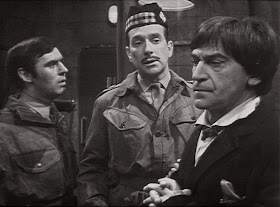The
first regeneration story I saw (and remembered seeing) was Tom
Baker’s finale, “Logopolis”. It was an emotional moment, but
not in the way I generally respond to regenerations now. It was not a
sad moment for me, but rather an immensely exciting one. As much as
Tom Baker was the
Doctor to me at the time, I couldn’t wait to see the new Doctor. I
had only recently really gotten into Doctor Who,
and was still learning about its history. And so I didn’t shed any
tears when the fourth Doctor uttered his famous last words, “It’s
the end, but the moment has been prepared for.”
When
Peter Davison’s final story arrived a few years later, my response
was a bit different. I was still excited to see the new Doctor and
looking forward to the regeneration, but for the first time, the
story actually grabbed me emotionally. It was more than just an
exciting adventure, and when the Doctor’s regeneration approached,
I found tears in my eyes. That had never happened to me with Doctor
Who before. Adric’s death had
shocked me, but not upset me. The fifth Doctor’s death, though...
That was powerful and upsetting.
“The
Caves of Androzani” is one of the most highly regarded Doctor
Who stories, and it remains one
of my personal favourites. A great deal of its strength comes from
the fact that it is such an intimate tale. It’s not about the end
of the world or the universe. It’s about a group of complex
characters fighting each other and the Doctor and Peri caught in the
middle. The Doctor dies making the ultimate sacrifice to save just
one person, and somehow that small-scale quality makes the story far
more epic and powerful than the universe-ending regeneration stories
some of the other Doctors have faced.
Of
course, every regeneration story should be different and appropriate
to its particular Doctor. Not every one should be small-scale like
“Caves”, and indeed, not every one is. “The Tenth Planet” has
a threat to the entire world. “Logopolis” has a threat to the
entire universe. More recently, regeneration stories have tended to
go big. “The Parting of the Ways” involves saving the Earth from
the Daleks. “The End of Time” is about saving the Earth from the
Master and the universe from the Time Lords. And now there’s “The
Time of the Doctor”, which is about preventing another Time War and
saving the Doctor and a whole lot more on top of that.
There’s
no doubt that “The Time of the Doctor” pretty much encapsulates
the entirety of Matt Smith’s time as the Doctor and Steven Moffat’s
time as showrunner. It’s big, bombastic, and full of wild and
wonderful ideas. Yet at the same time, it tries to do far too much,
mixing everything together in a kitchen sink effect. There are Daleks
and Cybermen, Sontarans and Weeping Angels, and the return of the
Silence. There’s a brand new character that the Doctor has known
for a long time. We see Clara’s family for the first time. Dangling
plot threads from the last three series are finally tied up in quick
lines of exposition. There’s a surprisingly relatable and
sympathetic Cyberman head. There’s a multi-century siege/war set in
a town called Christmas. There’s Matt Smith cavorting manically
around and acting his socks off. And of course, there’s a
regeneration—which has its own extra revelations to go with it!
This episode has everything and more. And consequently, virtually
nothing actually happens.
Don’t
get me wrong, there are some nice set-pieces here and there in “The
Time of the Doctor”, some individual moments that work
exceptionally well. But unfortunately, the whole is disjointed and
just doesn’t hold up. To be fair, like most Moffat-written
episodes, it is better on subsequent viewings (especially when the
first viewing is interrupted by commercials), but it’s not better
enough to really save it. Besides, it really shouldn’t be necessary
to see something twice in order to like it. Ultimately, this episode
just leaves one feeling unsatisfied, disappointed, and rather bored.
SPOILERS
FOLLOW





+Doctors.jpg)










